Context.
Lots of children have an admission to hospital and in many ways, my time as a patient in Tadworth Court hospital was an unremarkable experience. It is not something I dwell on. Opening a box of family keepsakes for another reason prompted me to look at some of the items and photographs of the time with a fresh perspective and reflect on just why they had been kept.
I was born with a disability of my left leg called a club foot which required specialist intervention. In fact, my first memory is associated with this because I remember being lifted out of a cot at Great Ormond Street hospital. I possibly had been admitted for a procedure called manipulation under anaesthesia. There was a fire in the building and I recall a massive amount of smoke and great staff anxiety. I’ve not been able to find any historical record of this event. My parents mentioned it in passing in later years, but now I wonder what impact it had on them and how they viewed the possibility of further admissions for me.
An operation is advised.
It was put to me in quite a straight forward way that this operation was necessary and would make my leg better. For the admission I went to Great Ormond Street first and transferred with three other patients to Tadworth Court hospital by ambulance. When we arrived it was mid-afternoon and a bath was required. This all seemed bizarre to me. It is the first time I can recall becoming an observer of interesting facts, experiences and observations which were well outside my previous life to that point. I was going to have many of these over the next few months and perhaps they set in me a pattern of thinking for the future.
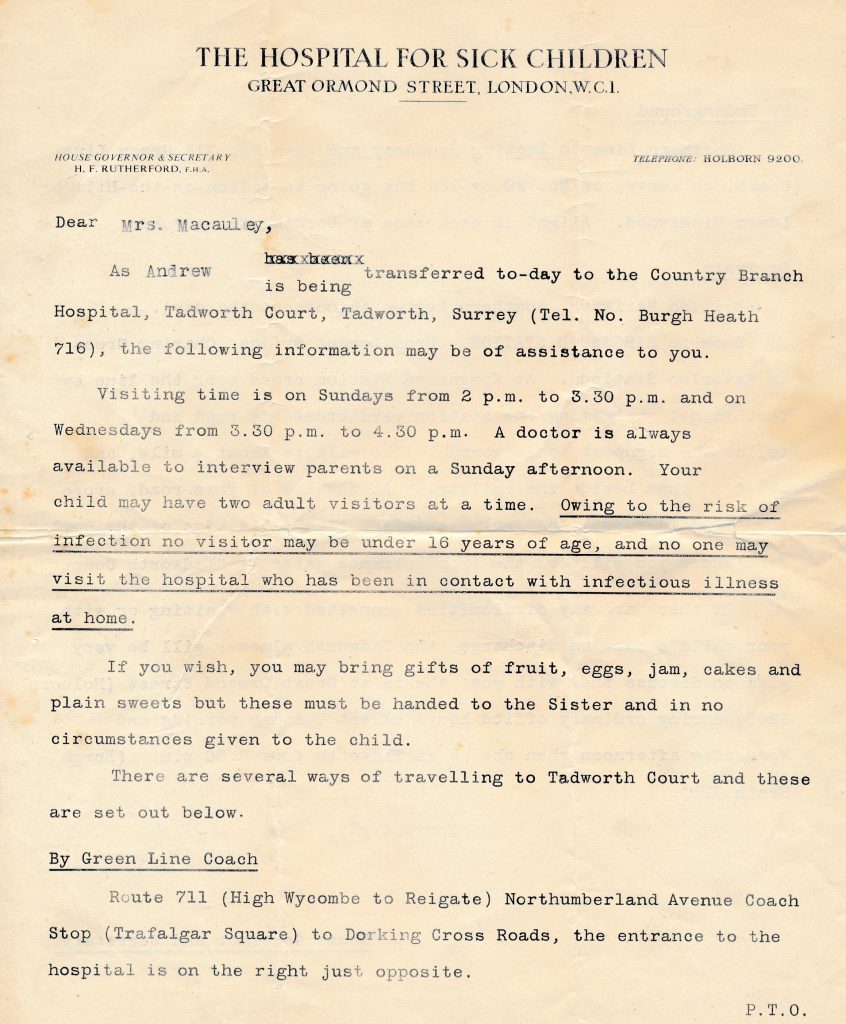
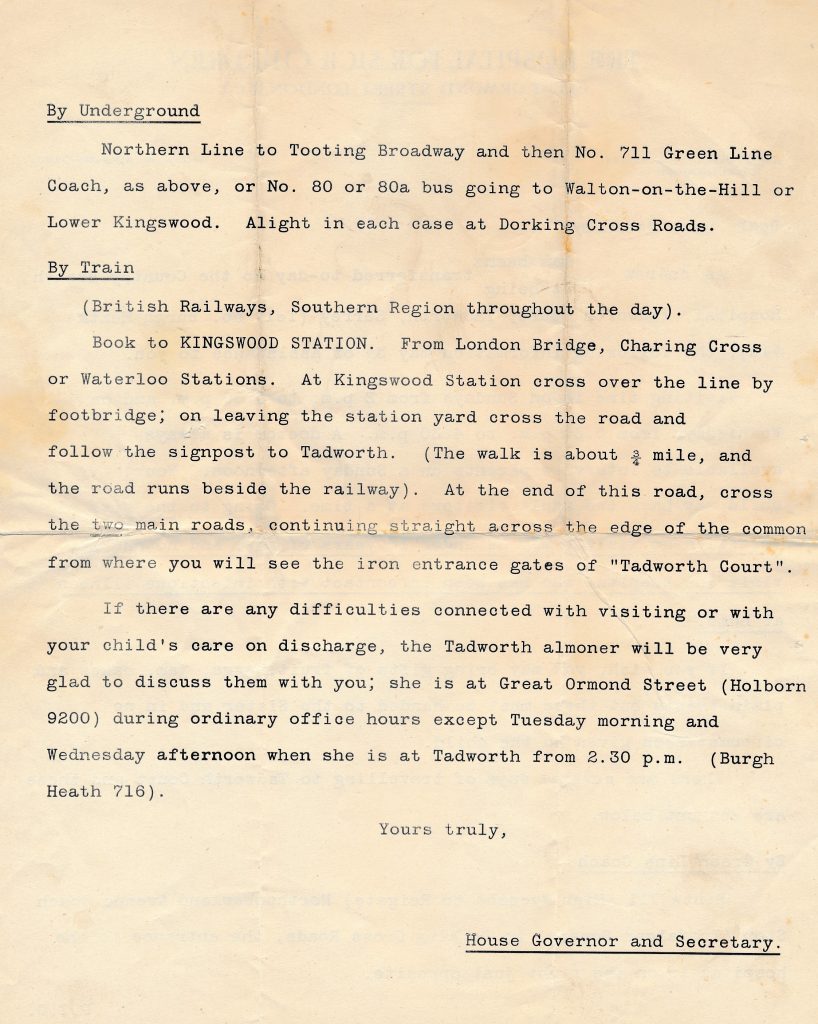
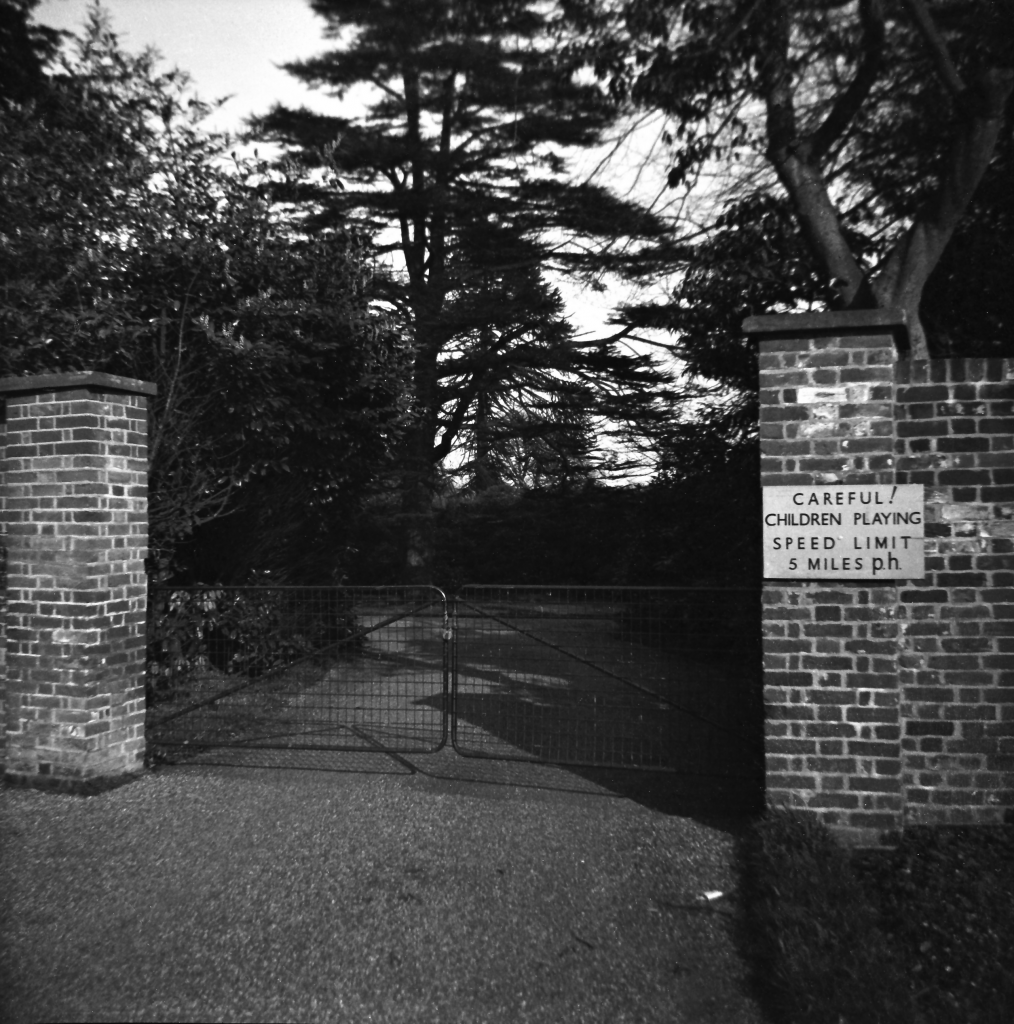
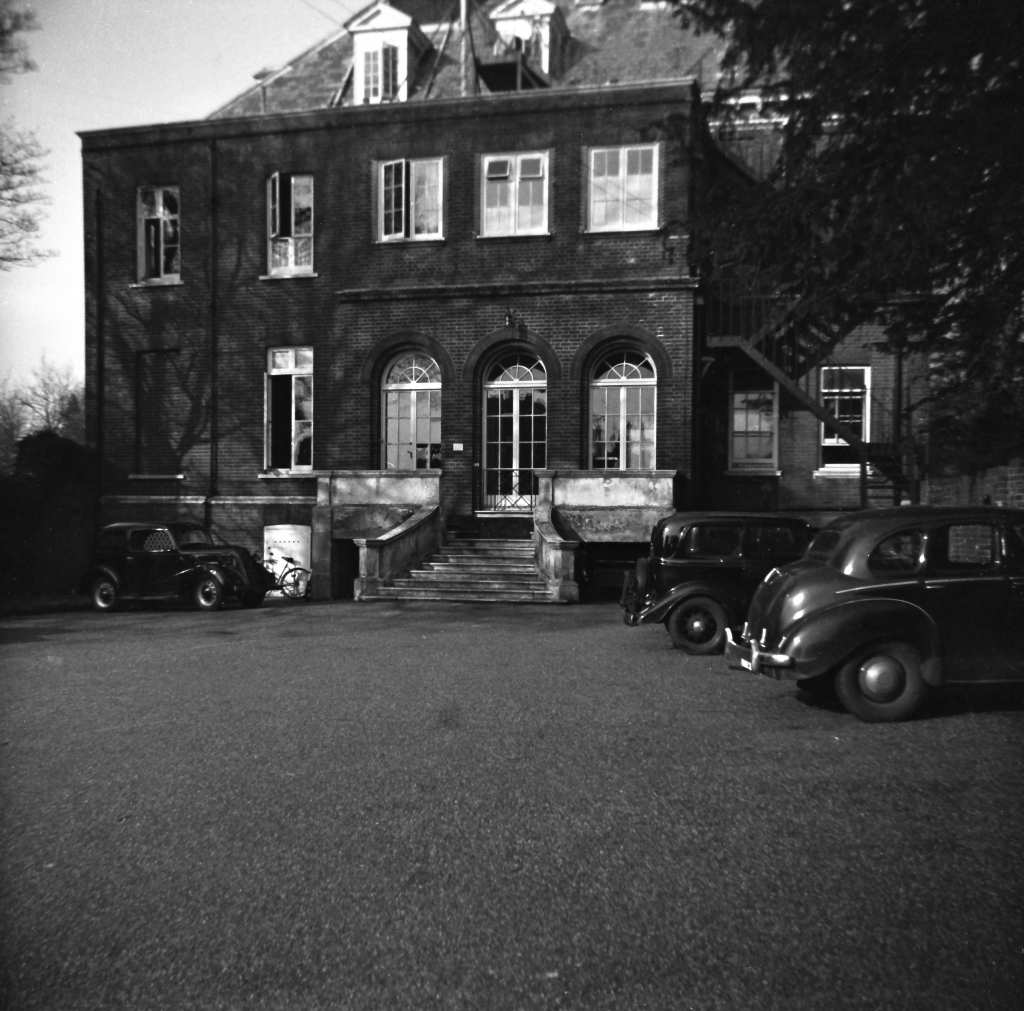
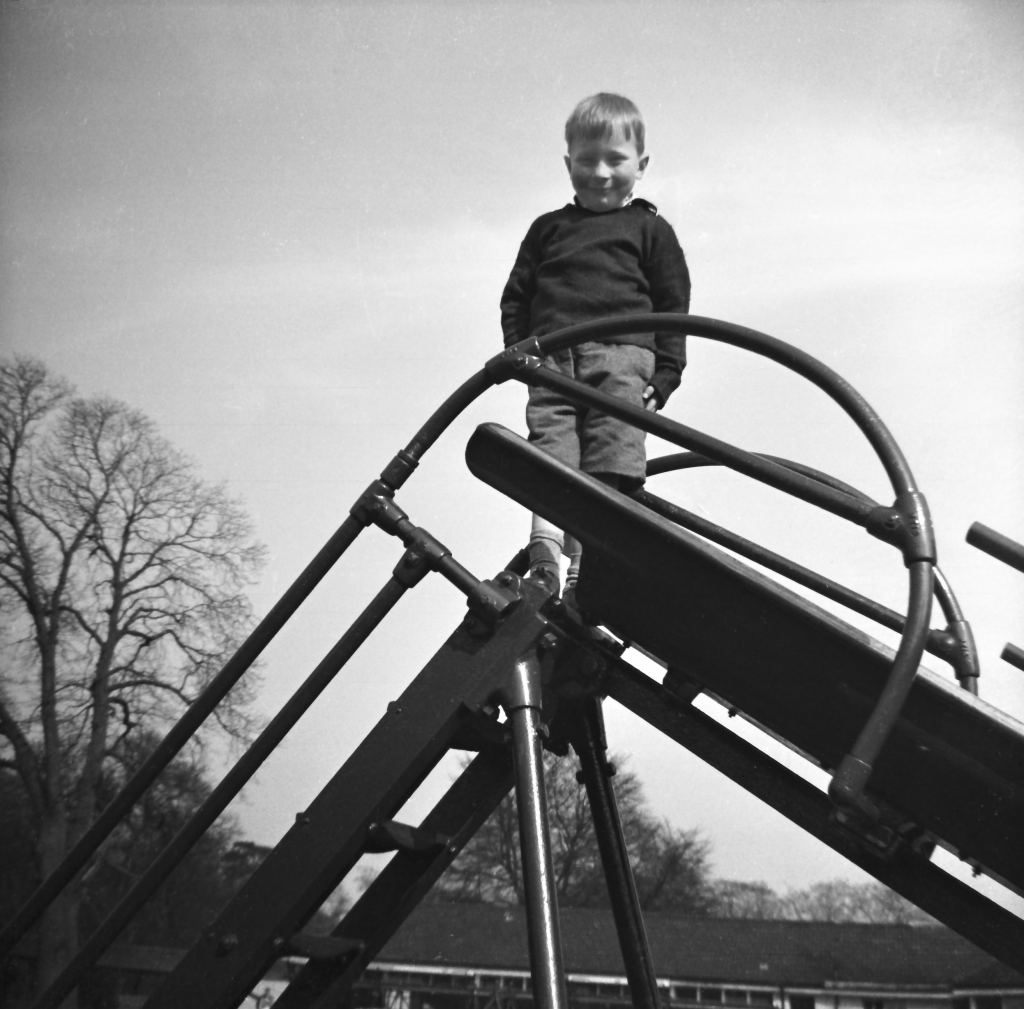
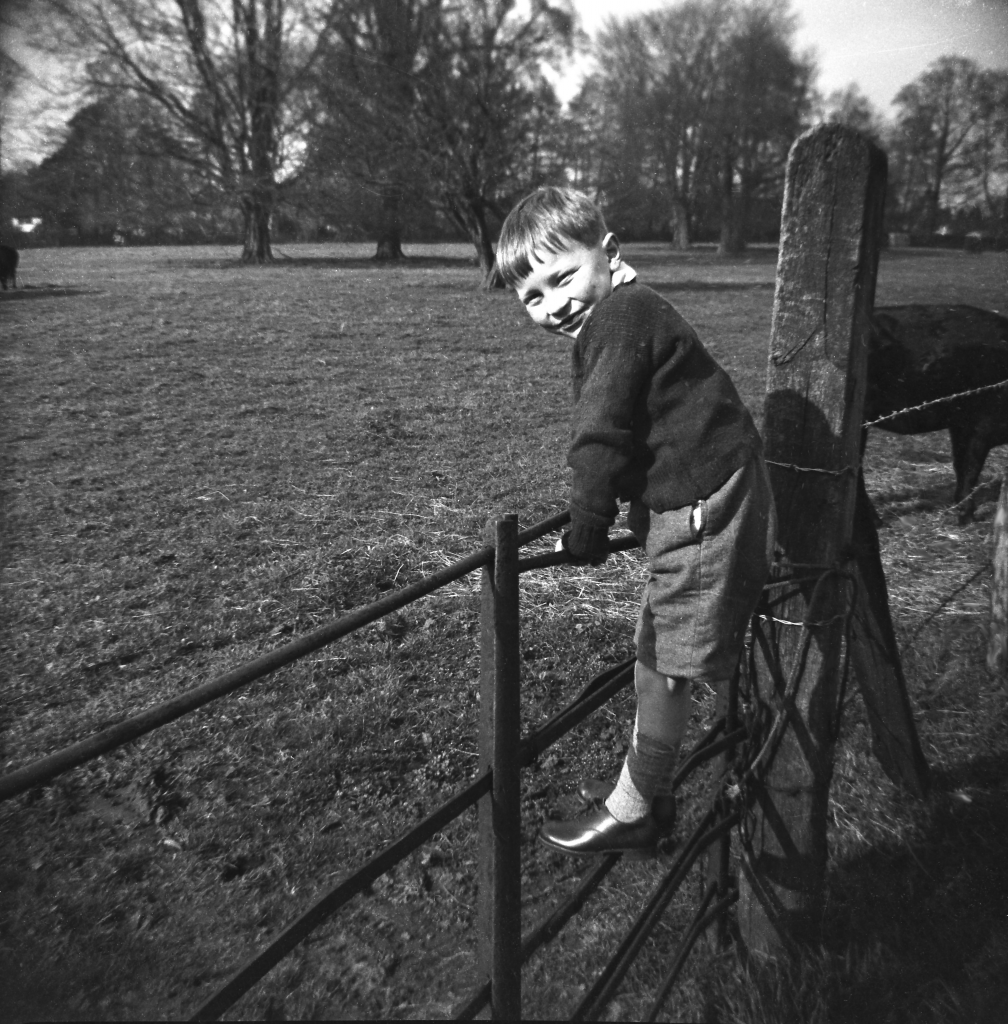
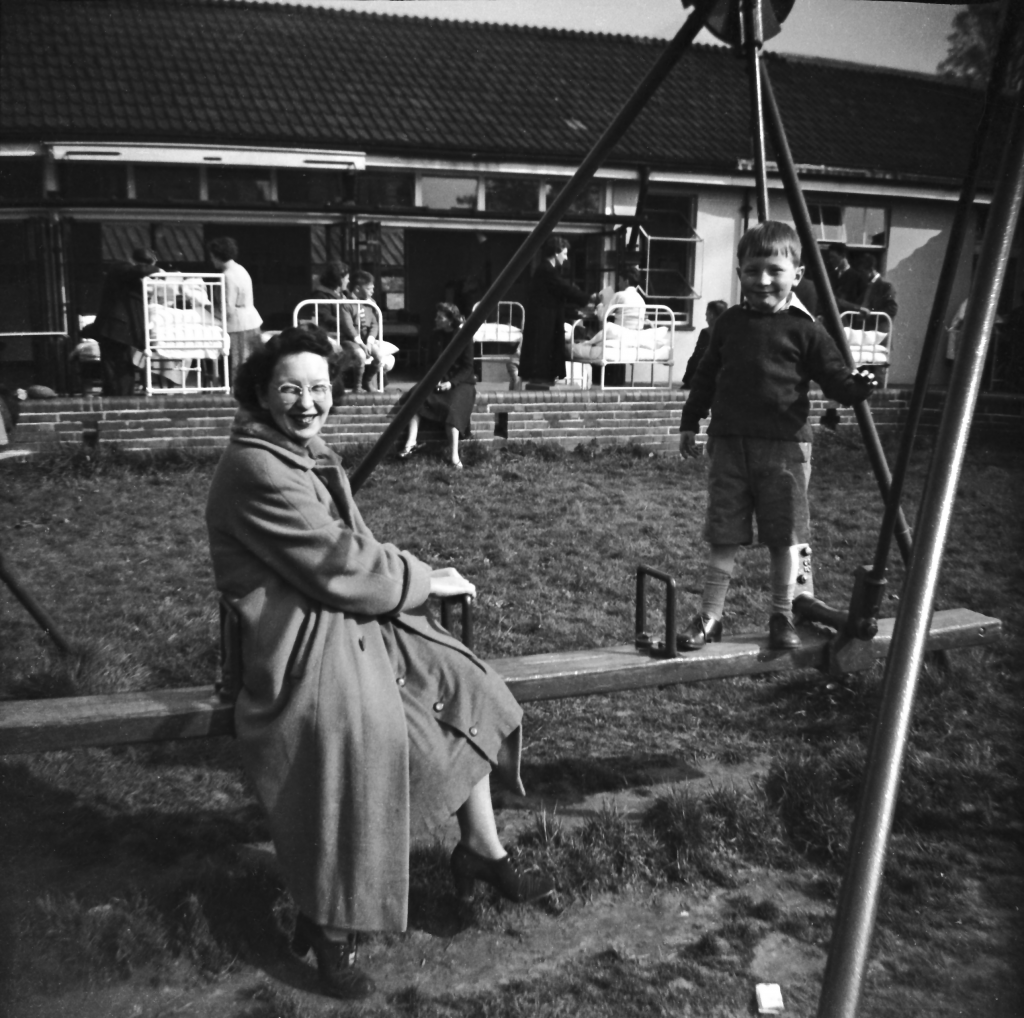
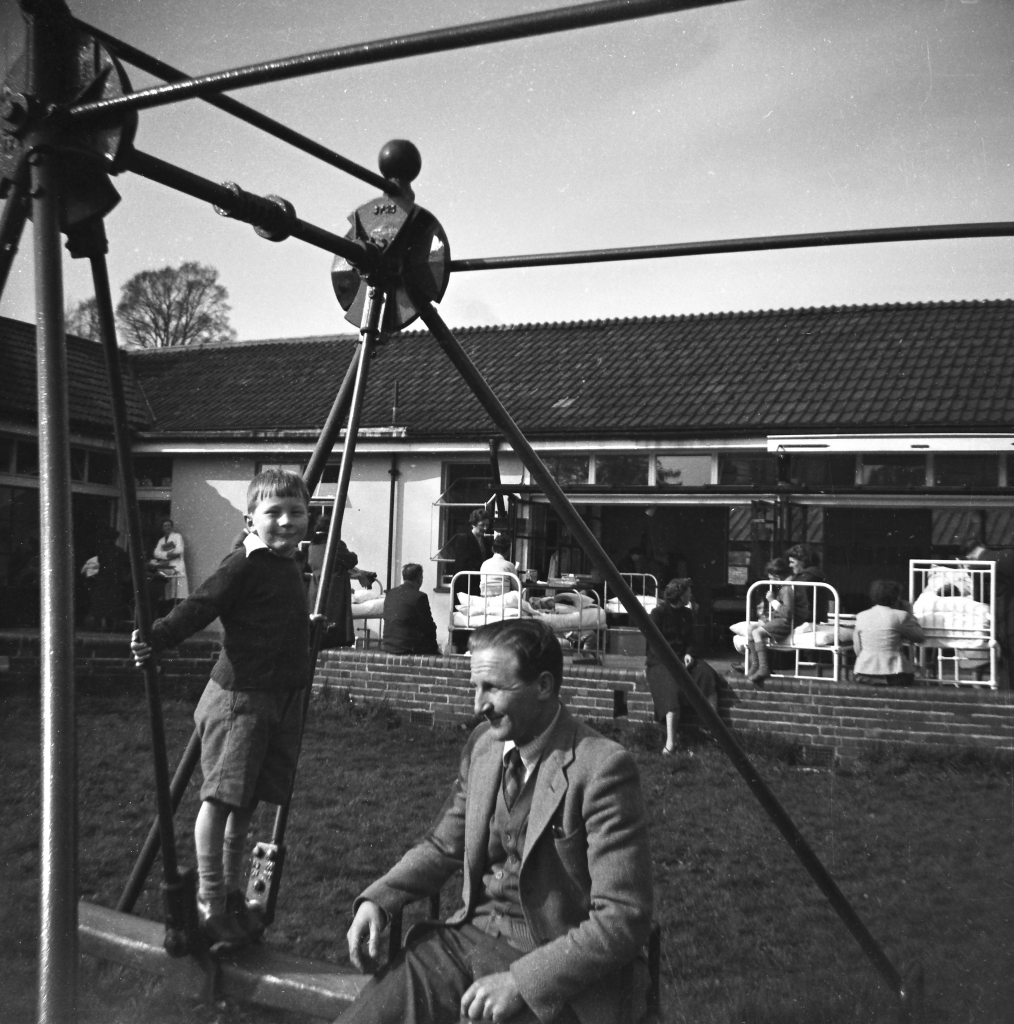
On their first visit, they left me with a few comics, but most surprising was the gift of a Kodak Brownie 127 camera and a couple of films. This was a simple camera that took 8 pictures on a roll of film. Unlike digital, the film has to be sent off for processing and prints made. It was an expensive hobby. I can see now that my interest in photography dates from then and that it was more than simply taking photos, but it was to record and illustrate in a documentary fashion.
The operation.
Zachary Merton was an open plan, nightingale style ward and I was in a bed on the right hand side towards the end. One of the nurses explained that I would have a pre-med, feel drowsy, probably fall asleep and then wake up back in my bed. And that was what happened.
I had seen other children come round from their surgery on previous days so I had a vague idea of what was involved, and had discussed it with them. However what I was not prepared for was the excruciating pain. I had a tendon transplant and this involved several incisions, one of which was extremely painful. For years afterwards it remained very sensitive and painful to touch. Even now, more than 60 years later if I think about it I can still sense the pain acutely. Yet other sites and injuries have never had that lasting effect.
Whilst on post operative experiences I certainly had vivid, near psychotic dreams, seeing a bright light emanating from a stage. In my dream I was in the audience. It didn’t disturb me, and even at the age of 5 I was able to reason that this was likely to be related to the anaesthetic in some way. The major site had become infected and there were times I was delirious. After a few days the acute pain subsided. I was in a below knee plaster for a number of weeks. It was changed a few times, initially for dressing checks and these were distressing and painful experiences.
My energy levels were very low. We had school lessons and I progressed with my reading but recall finding it far too difficult to concentrate on anything at all.
Communications from outside hospital.
Almost every day I received a post-card or two, sometimes a letter. What is striking about these is the relentless positive expectations in the communications, somewhat in contrast to how I was actually feeling. Even then though, I could see that the authors were trying to cheer me up. Also the cards were a pointer to me that this was a bigger deal than I had been led to believe. One surprising letter was from Sooty enrolling me his club. I wondered how he knew I was in hospital. I also appreciated the sentiments written on the card, which at the time I thought more appropriate than some of the others I was receiving.
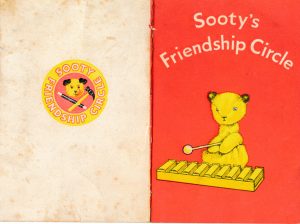
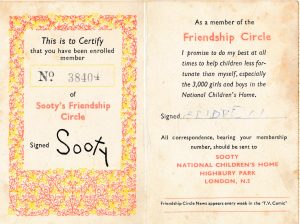
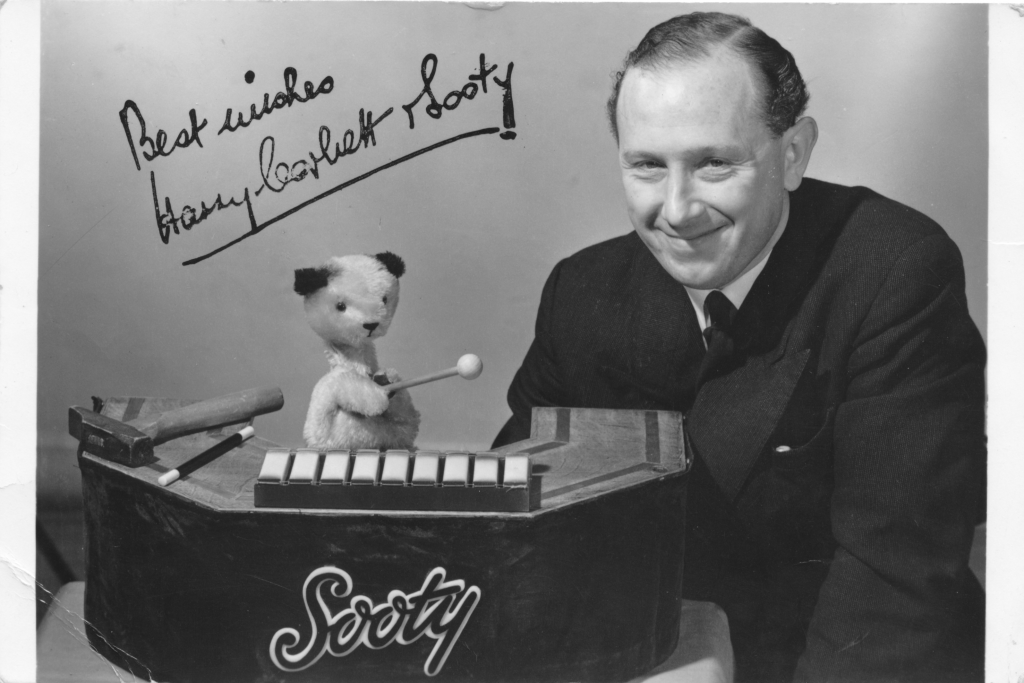
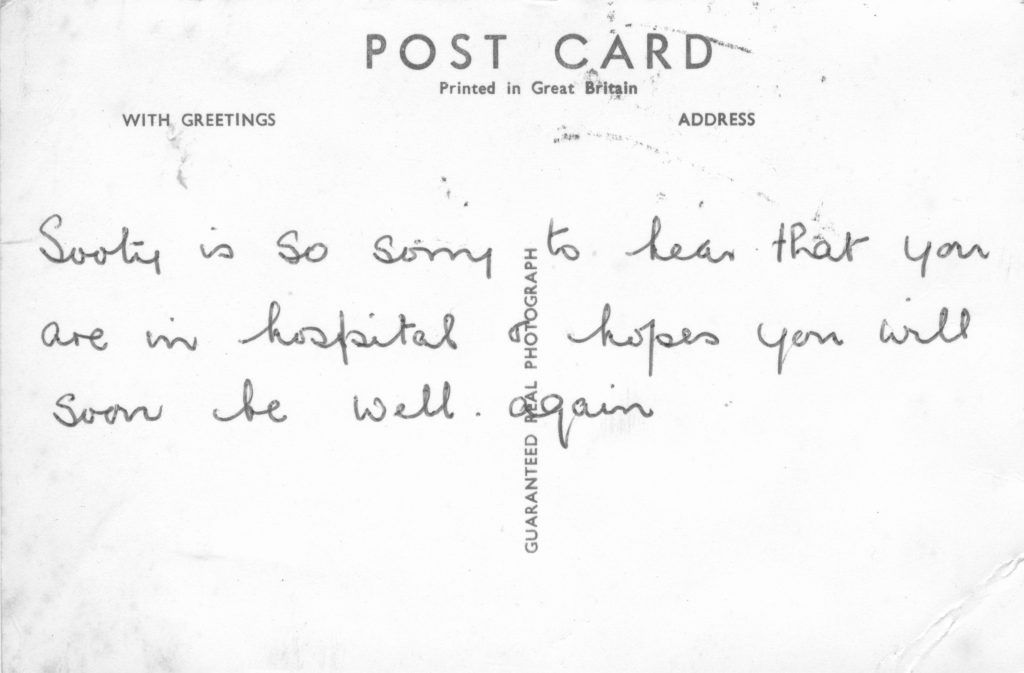
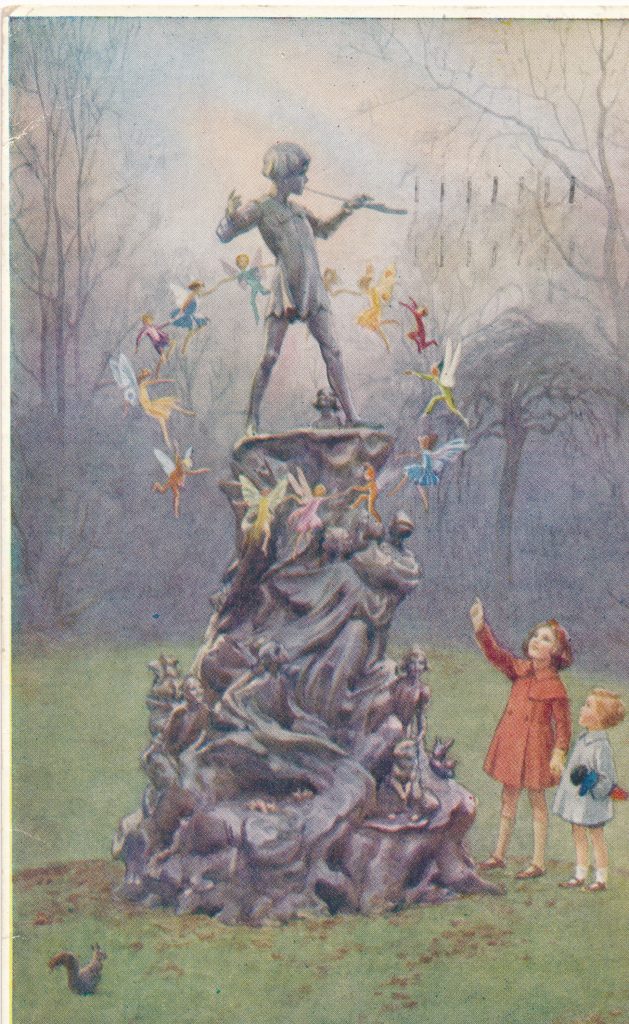
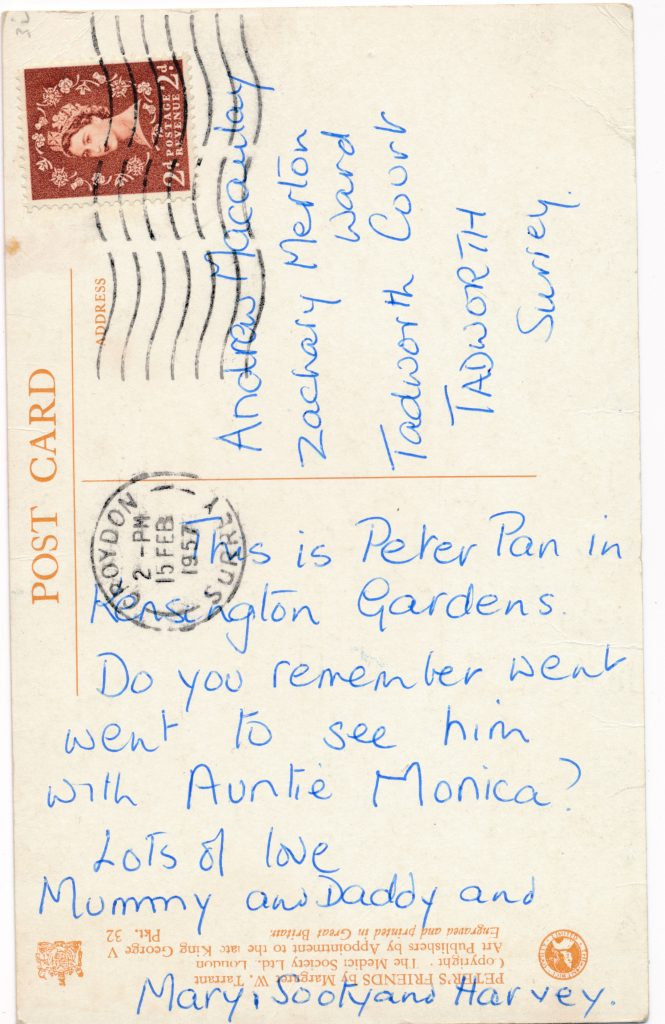
Another notable batch of letters came from my school friends. This really did surprise me. I don’t think you can read too much into the actual content. We were only five or six at the time after all, but I do recall being pleased to get the messages. I did use the crayons they sent me and managed to write back a couple of lines to say thank you. Then later during my stay I got more letters.
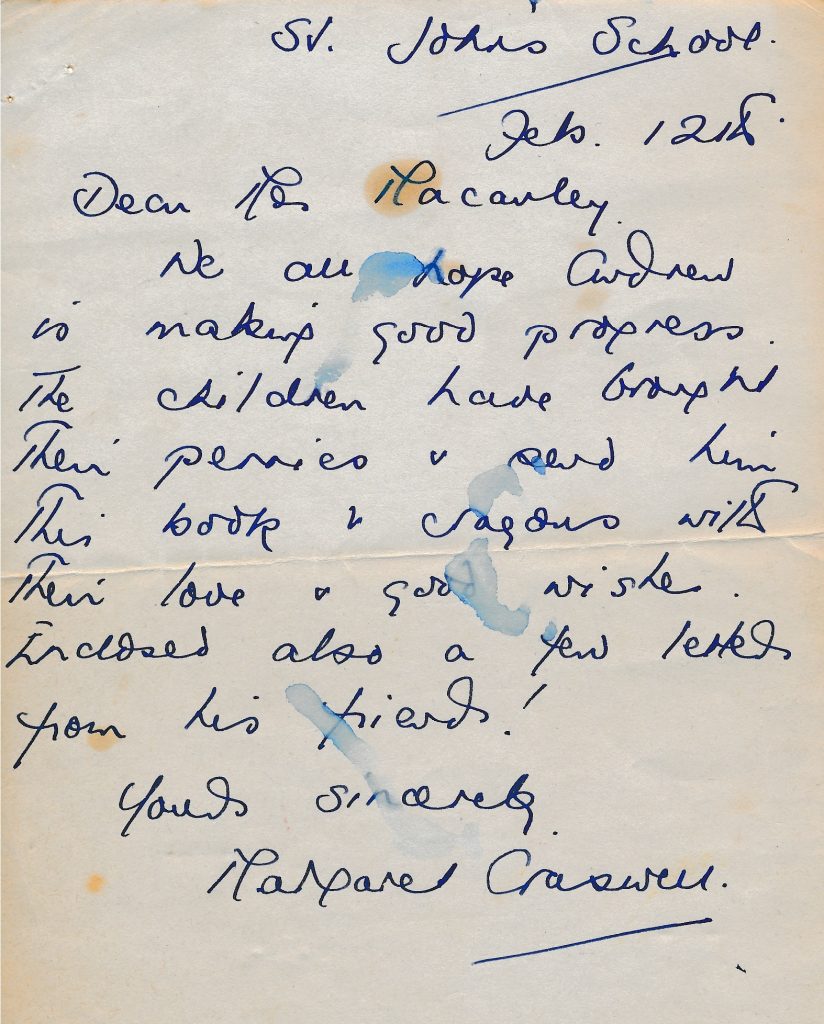
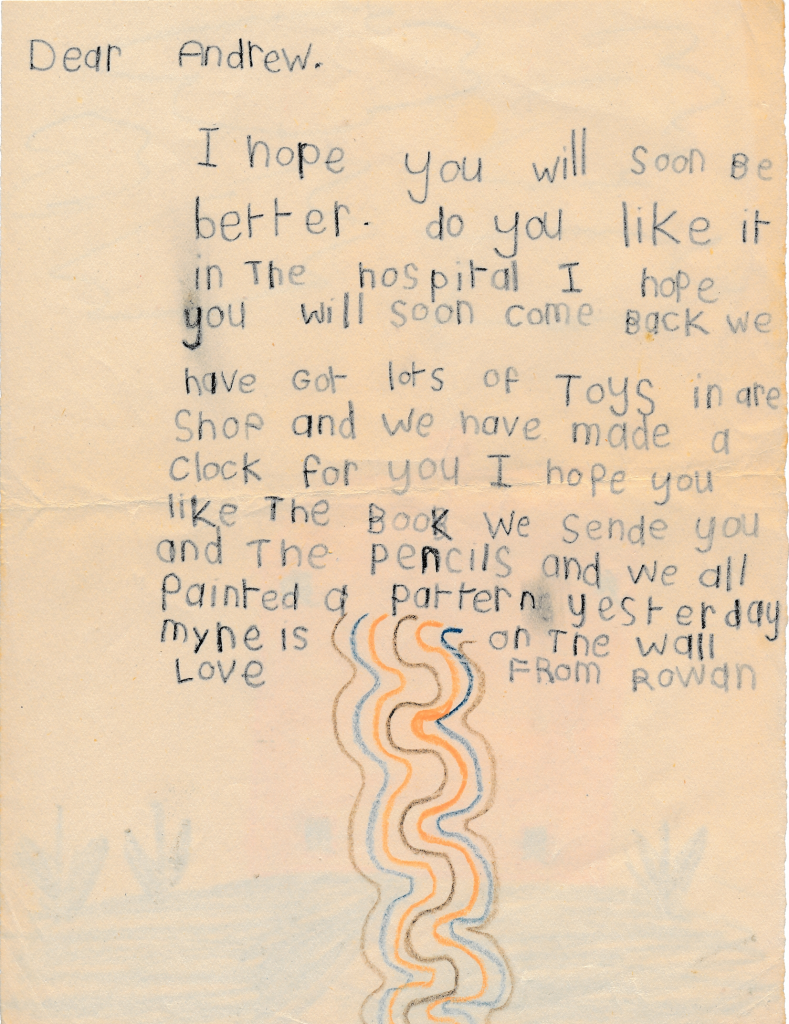
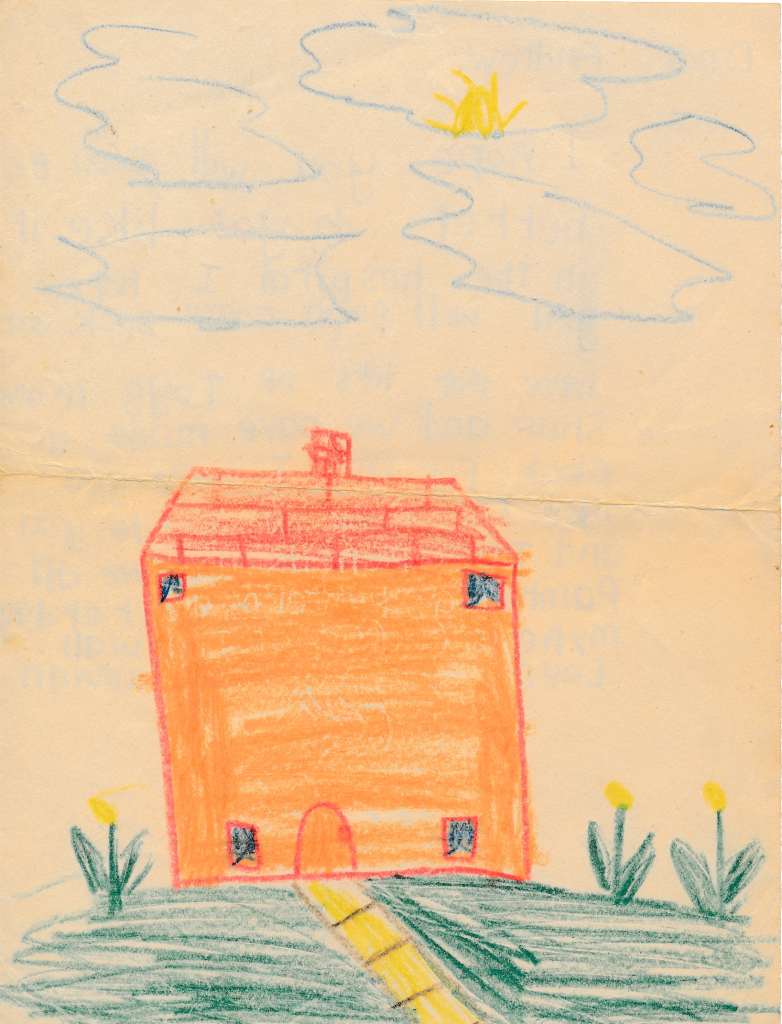
The content of the first set followed a theme, whereas the later letters were somewhat more freeform. Other cards and letters were from the extended family and family friends. Some were thoughtful and appropriate, others providing news.
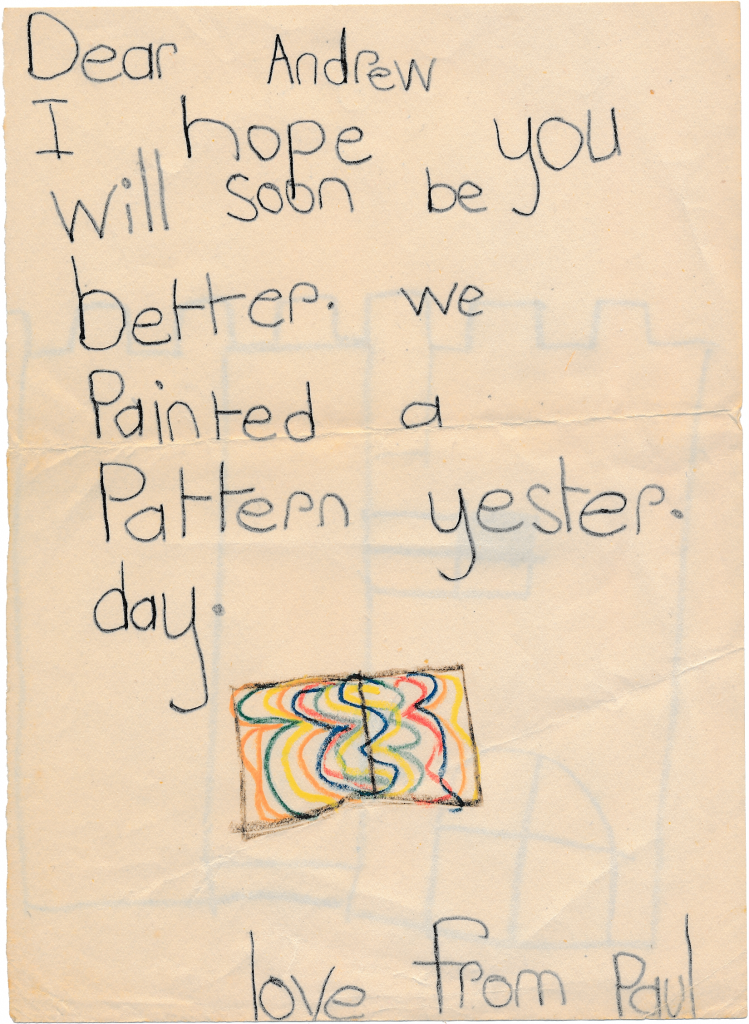
On discharge, I received a few letters at home from my school friends. How did they know I had left hospital? I just accepted this as something else I didn’t know the answer to. But who had told them, and what did that say about the whole episode? I locked these questions and implications away.
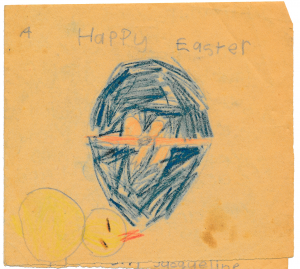
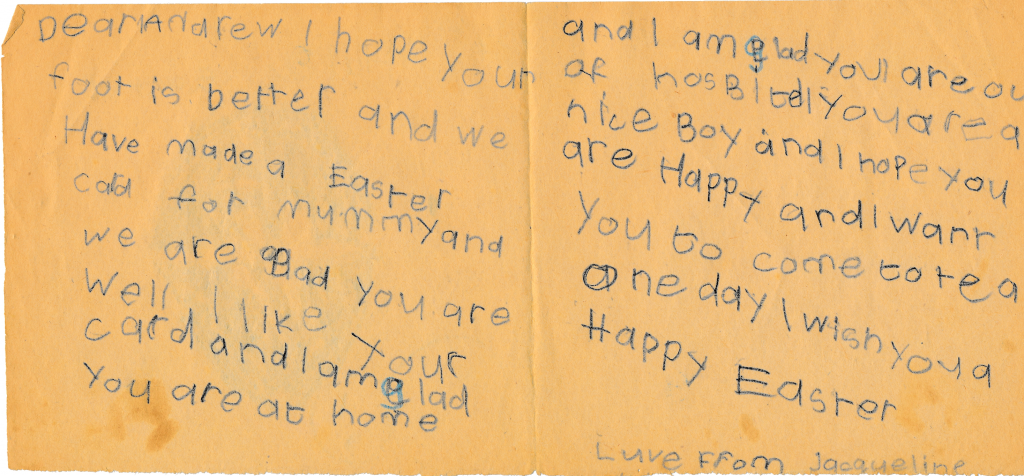
Life on the ward.
Visits from the consultants were a big deal in the week, the ward tidied up and beds remade. I only have a vague, shadowy memory of the surgeon visiting me for a follow-up assessment on the ward, but it must have happened. What does it mean that I can’t really remember? Anything?
It was a general paediatric surgical ward. On one occasion the urological surgeon came to review his patient in the bed next to me. The operation had not been a success. He asked the ward sister whether urine was still coming from the same place, I vividly recall the pause and tension before she answered with very carefully chosen words. “Yes, I am sorry, the same place”. I could see and feel him crumple in size and stature and then the memory fades out. The success of the operation obviously had meant so much to him and the failure was acutely unbearable. I had a very powerful urge to say something kindly and supportive to him. I can see now that this observation profoundly contributed to my desire to become a doctor and maybe a psychiatrist.
We were encouraged to sit at the table for meals if able. What did we eat? I really can’t remember.
The photograph of me at mealtime is underexposed but I include it because I find a number of things are very interesting. The four busy nurses on the ward, the glass milk bottles and the ward layout for example.
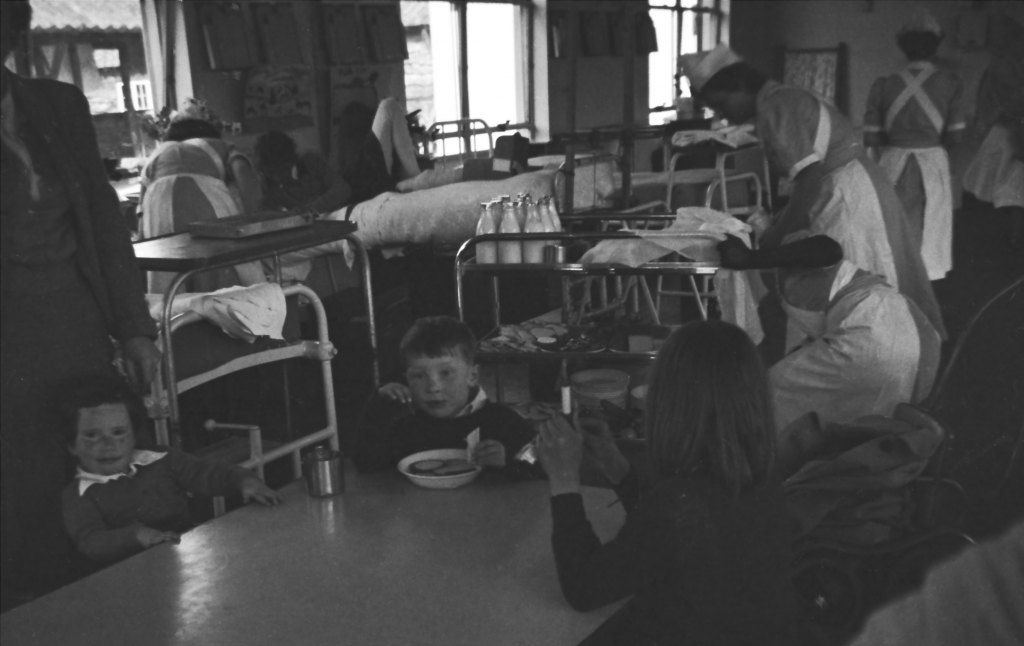
The next couple of photographs were taken a little later. In passing, note the full length opening windows and level access to the outside, so the beds could be pushed outside.
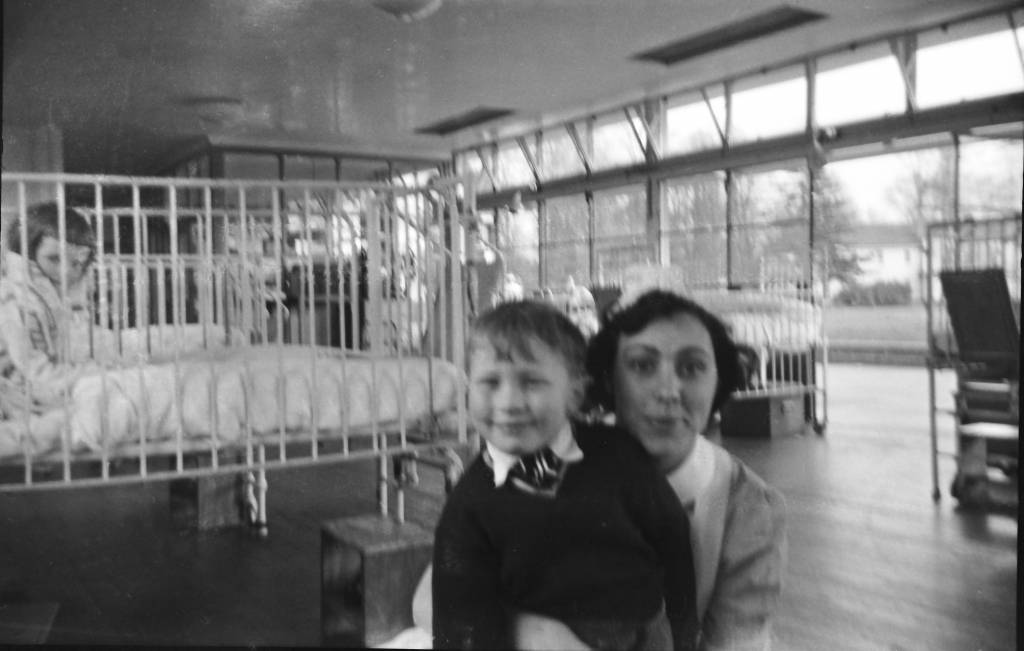
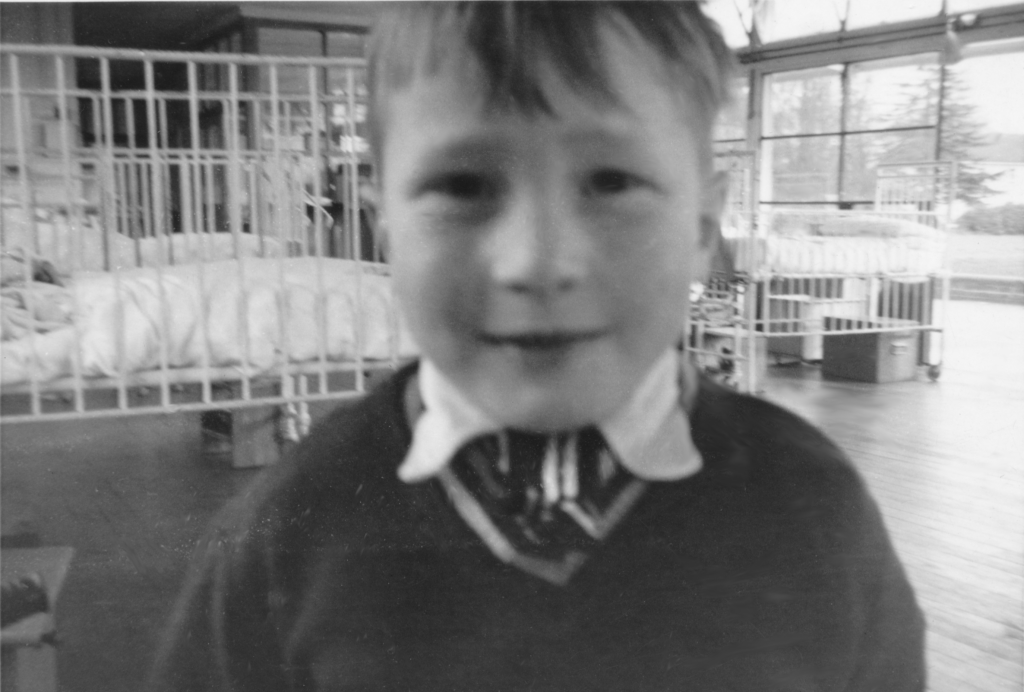
My recollection of the nurses is that they were kind and engaging. When I had my dressings exchanged they were extremely sympathetic.
Measles.
The figures for 1957 make for shocking reading, 633,678 cases and 94 deaths in the UK. It is very easy for us now to forget or minimise the impact of childhood infectious diseases. Those in hospital for whatever reason are especially vulnerable.
The original transfer letter highlights the risks of infectious disease. It was a great worry for hospitals and staff. No vaccines and a closed institution with high risk patients. Infection would spread within hours.
In March 1957 Tadworth Court hospital imposes a strict isolation protocol. This includes no visitors at all. It was explained in simple terms to me and in some ways did not affect me very much. However, my parents had visited at every opportunity, and given how ill I had become it must have caused them great worry. At previous visits, birthday presents had been discussed, leaflets brought in for me to look at and consider. I had no idea of the cost of the wonderful train-set I was going to receive.
As usual on Sunday, this time my birthday, my parents made the long journey to the hospital to see me, bringing my present. They were not allowed to come in, but had to stand outside at the window and opened the box to show me the train set. A nurse had told me what was going to happen and I stood by the window. The train-set looked fantastic and I felt thrilled, but what to do, how could I show my thanks and pleasure? I had no idea. The nurse was still with me and she prompted me to smile and wave, which I did. After a minute or two my dad carefully put the lid back on the box, they both looked up to me and waved, even at the time I thought, sadly, turned and slowly walked away, taking the train set with them.
I never did say thank you properly.
Photographs.
I took these photographs when I was more mobile. Then, it was very unusual for a child to have a camera.
Even in March, an outdoor life was considered good for recovery.
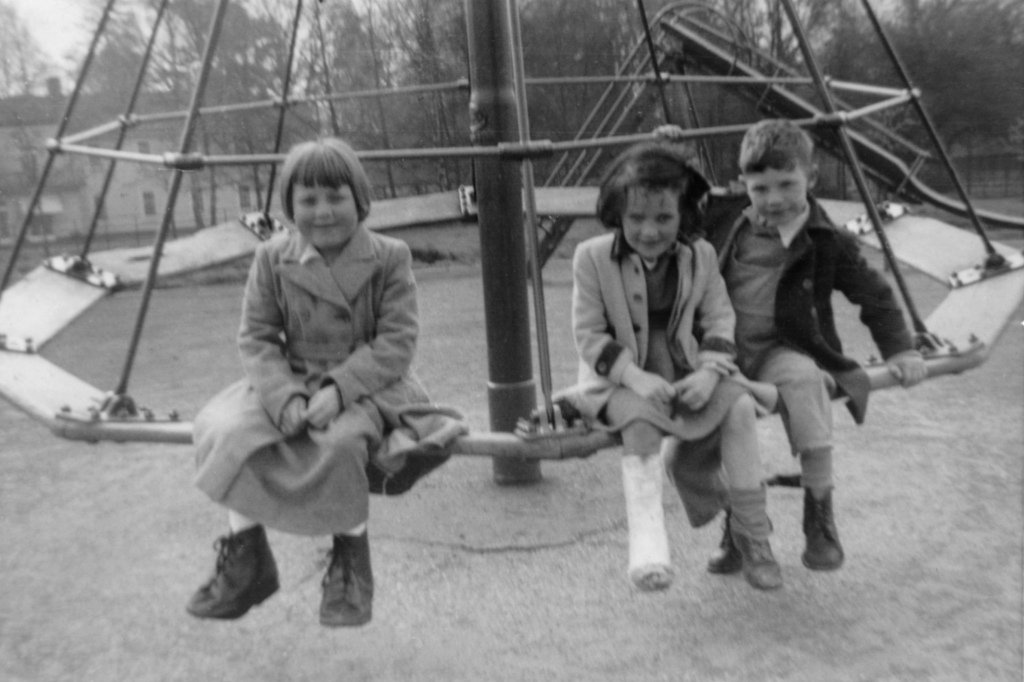
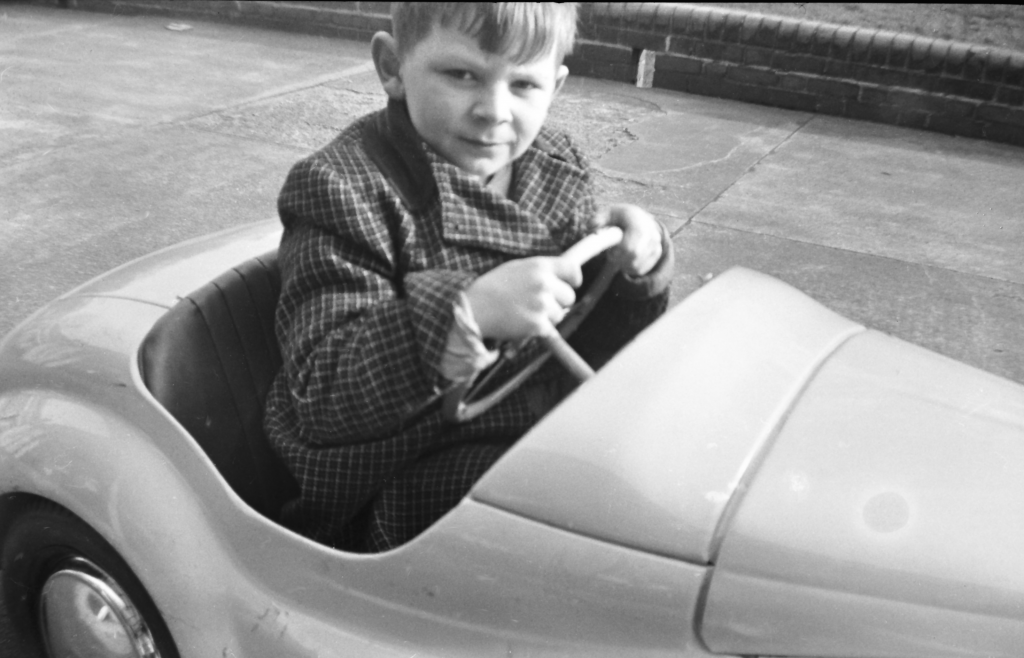
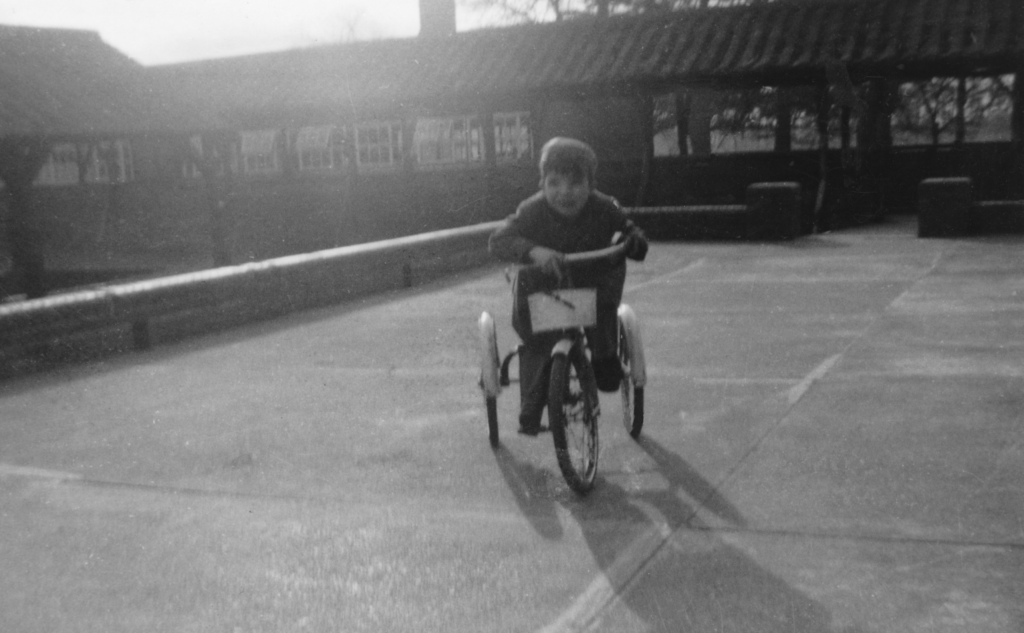
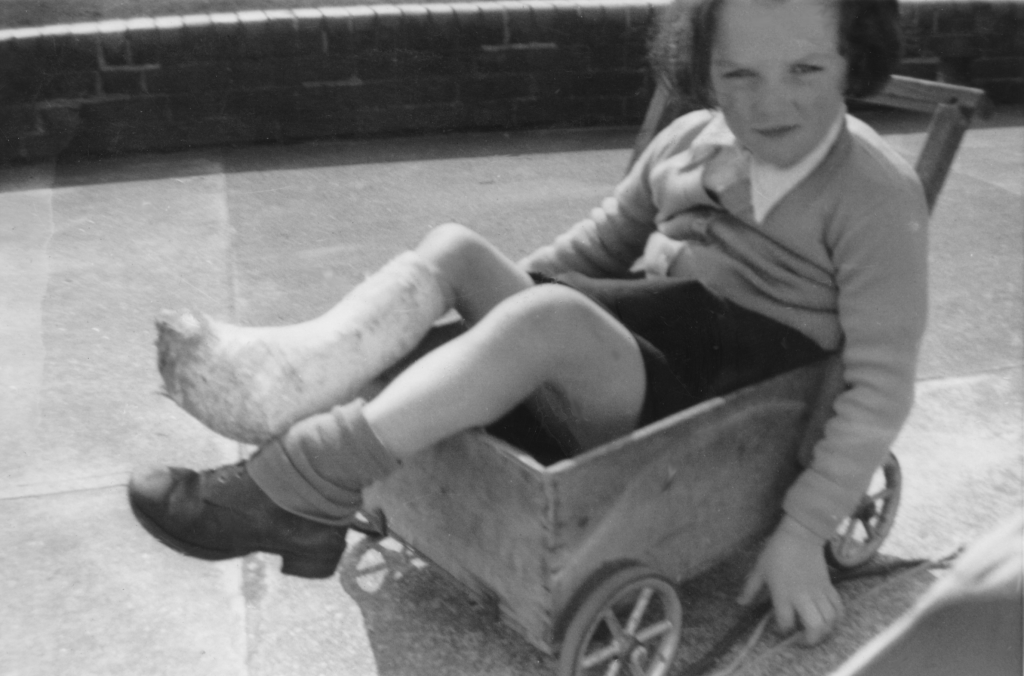
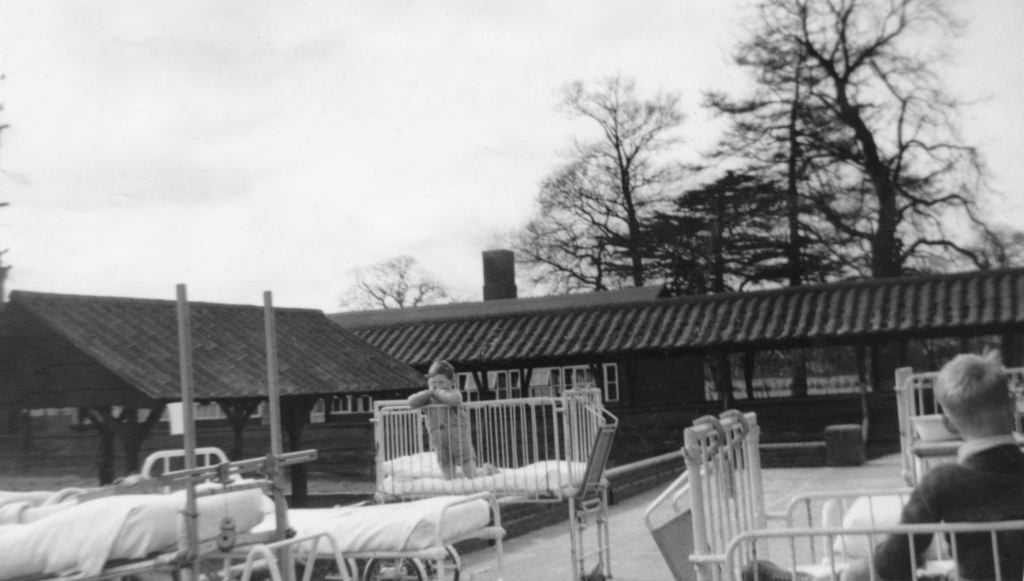
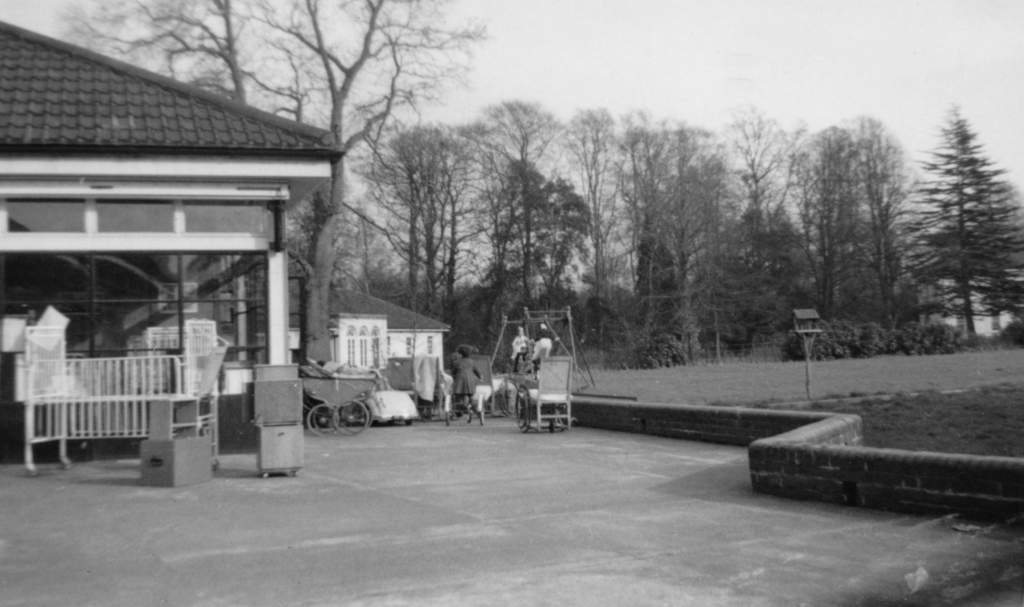
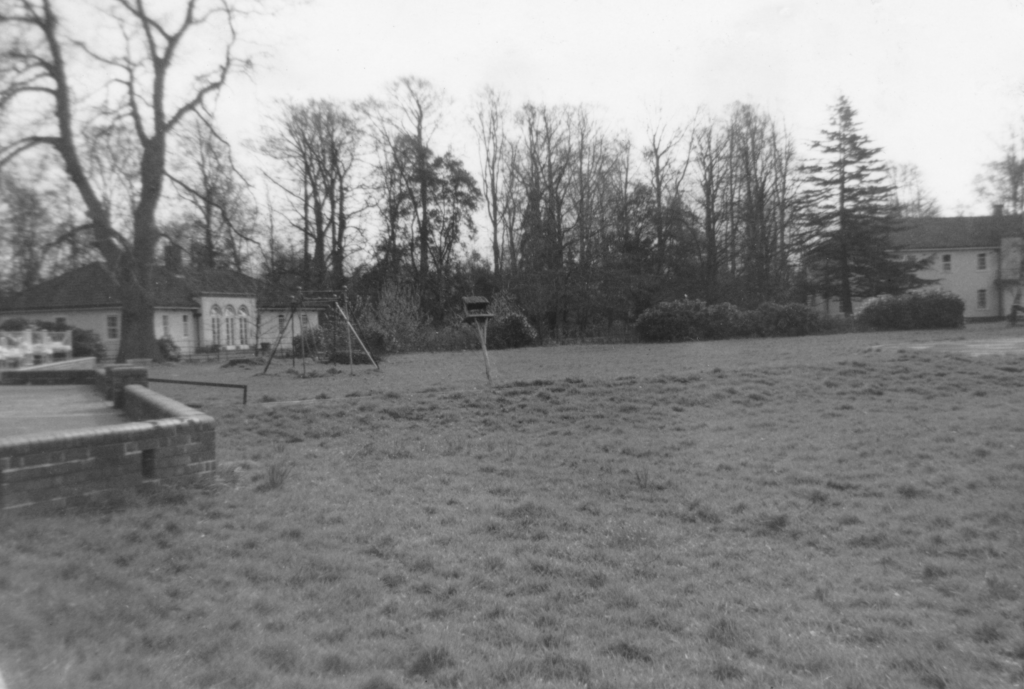
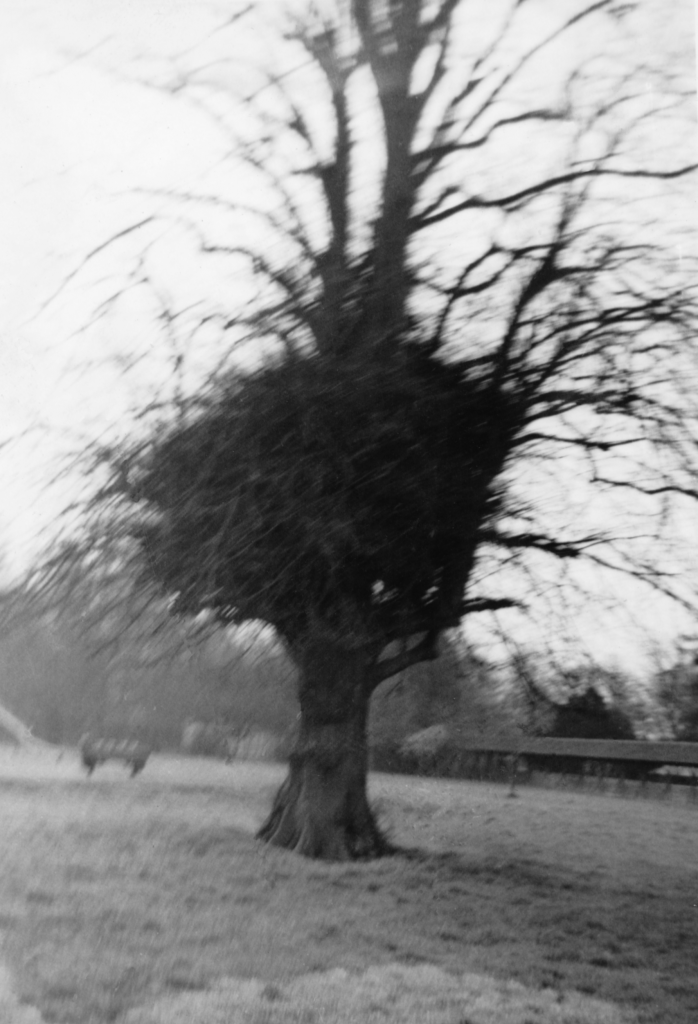
Shortly after my operation I was moved from the far end of the ward to be next to the nurses’ station. I presume because I wasn’t very well.
The next three shots are from my bed.
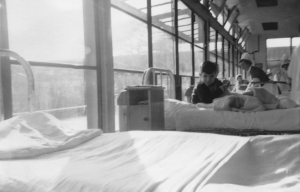
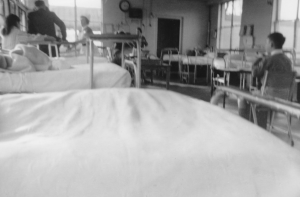
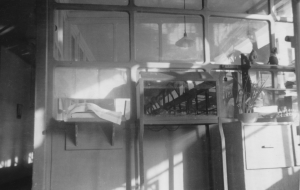
The sand-pit bully.
One of the most popular activities was playing in the sand-pit. This was quite a grand covered structure. After a while, I was allowed outside, but access to the sand-pit seemed to be limited and dominated by the older boys. Eventually of course they leave. One insisted that the sand castle he created should be left intact for ever, and if it was knocked down he would come back and rebuild it. At the time, I did wonder what motivated him to be like that. Surely he could realise what a ridiculous assertion that was? I was learning about psychology.
Of course, within minutes of his departure, it was destroyed with great ferocity.
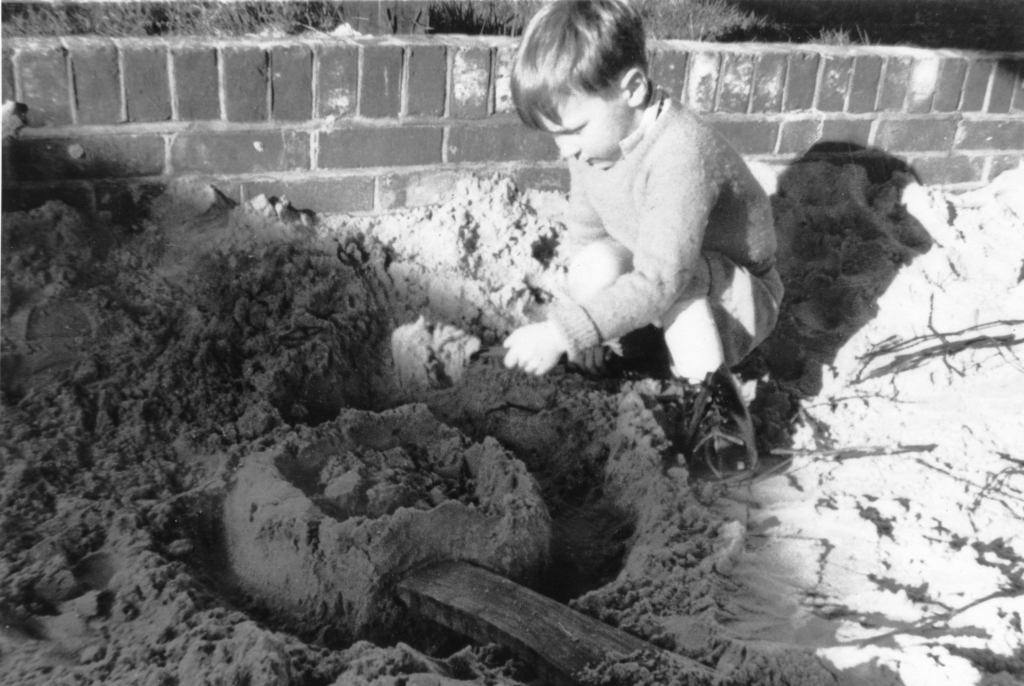
Psychotherapy.
Another experience that surprised me was my relationship with one of the other patients. Once I had got over the acute pain and begun recovery, inevitably you have time. No television, radio, internet, mobile phones or other immediate distractions were around at the time. I found myself talking to the other patients.
One girl of 5 or 6, in particular talked to me at length over the weeks about her home situation. I can’t remember the exact details, she was very unhappy and I think there was a lot of parental conflict. Before she left she told me how useful it had been for her to talk to me and that it had helped her to feel much better. I was taken aback by this news and also pleased that our friendship and discussions had been helpful to her. I had learnt about the power and importance of active listening.
Clearly, I didn’t think at the age of six that psychiatry would be the career for me, but this was another formative experience.
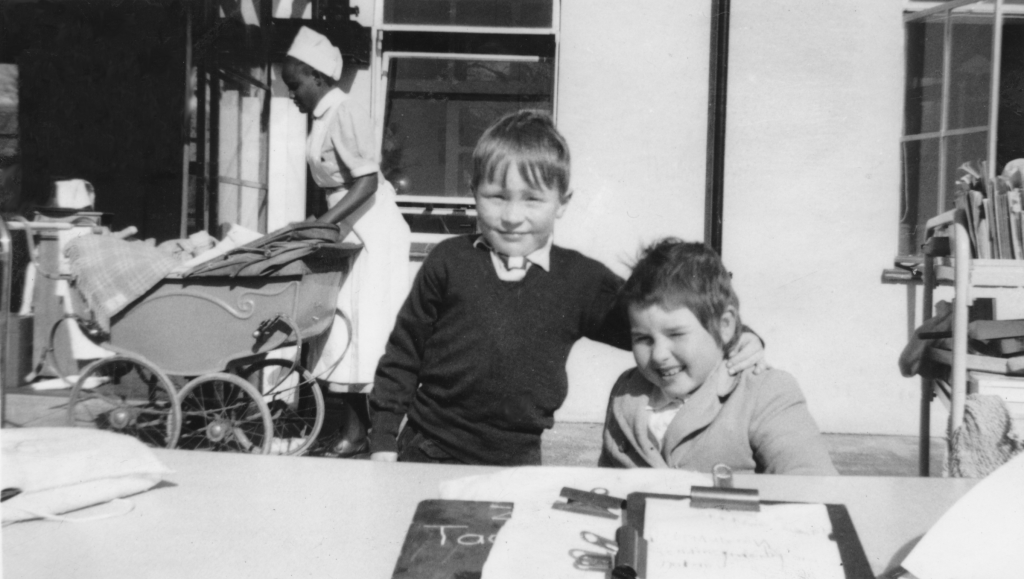
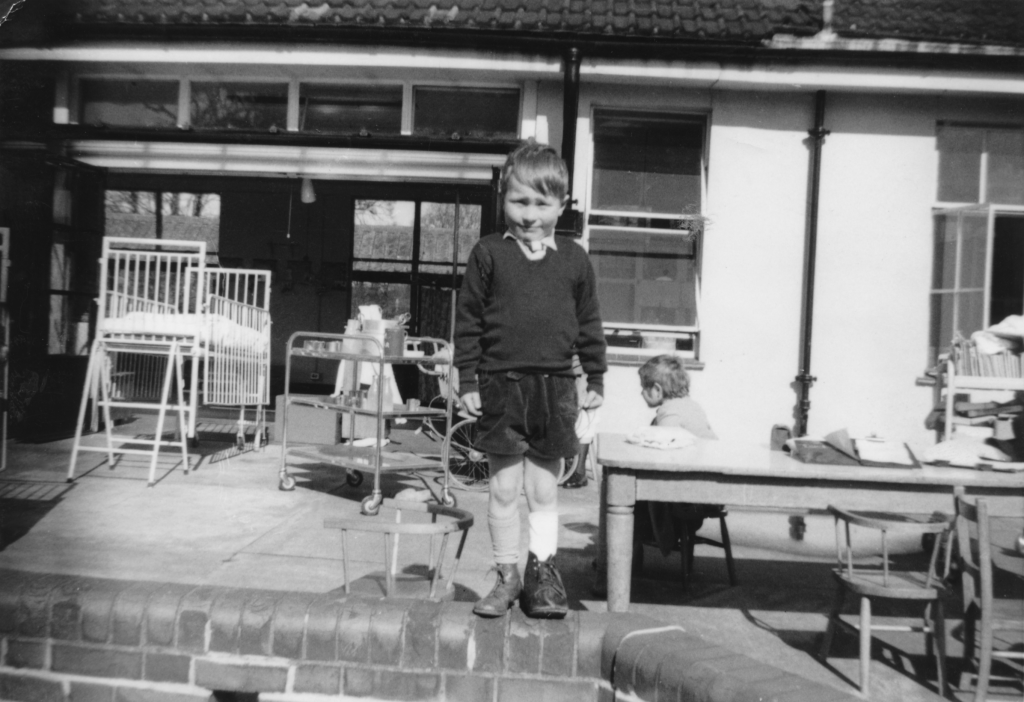
You do realise that over the years there are many people who have helped you, and you should have thanked them, but didn’t.
I go home.
I was in hospital for at least 12 weeks. I can’t remember being discharged and I returned to school early in the summer term. I had fallen behind with the school work, but that didn’t seem to matter too much. Within a week or so my time in hospital became encapsulated as a stand-alone memory. It wasn’t really discussed with my class mates.
At the follow-up appointment at Great Ormond Street hospital the surgical result was considered a success. I was sent off to have a photograph taken for the medical notes. It is a pity that I don’t have a copy. I wasn’t asked about my views of the experience.
A couple of other operations have been suggested, one in my teenage years which I declined on the basis that I didn’t feel able to tolerate the post operative pain. It might have been helpful if I had said at the time that was the reason. Overall, I don’t think my disability has greatly affected my life. I concentrate on what I can do, rather than what I can’t.
However, Tadworth Court wasn’t the last hospital experience. There was the time I got run over in a car accident. That, as they say, is another story, but it didn’t have the same emotional impact on me, though what my parents thought I don’t exactly know, but perhaps can guess.
In later years at school I became very interested in science, technology and photography. I seriously considered a number of career options in those fields. In the background though, I began to recognise that not everybody was interested in the emotional and psychological side of life.
I went to medical school. After qualification, I took the opportunity to work in psychiatry, thinking that it would be useful in my career as a GP, but in the end stayed in the speciality. I have been very lucky in that it has really suited me and I remain passionate about what can be achieved.
How much did my time in Tadworth Court hospital contribute to that decision? In the end, probably quite a lot.
And now.
Looking at the photographs now, it is a pity that I didn’t have greater technical skills or take more photographs. But at least there are some. The letters and postcards make for interesting reading; they could so easily have been thrown away. It is difficult to know what to keep in life, but my mother obviously recognised the emotional importance of them to her and later, correctly, to me as well.
It may seem remarkable that I have so many clear memories of the time when I was only just six years old. I observed the way one of the nurses was marginalised by her colleagues, leading to the formation of quite a sophisticated understanding of group dynamics and yet at the same time having childish needs and perceptions.
I do wonder though, given how much pain I was in, why didn’t I ask for medication? Or did I and none was forthcoming? And if so, what effect did that have on me? I have been quite self-sufficient in many ways, does it originate from then, or is that just who I am anyway?
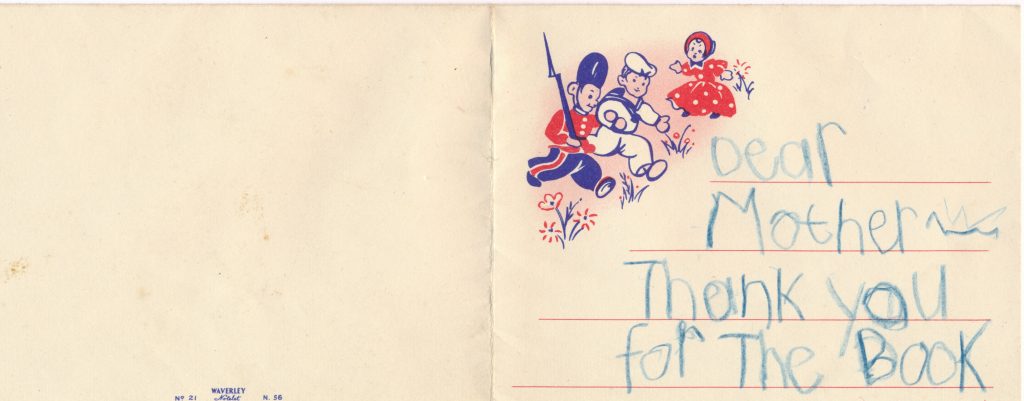
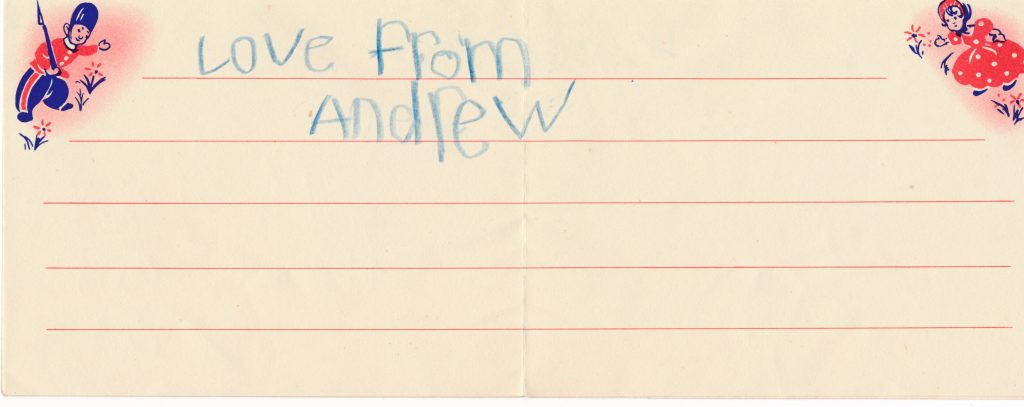
One of the main differences for me now, 60 years or so later is that I can see the experience a little more from my parents’ perspective. What did they think when the postman delivered my letters? They never really discussed their feelings about me needing operations or the stormy time I had in Tadworth Court hospital. They died some years ago and I very much regret not having the chance to talk to them about it.
